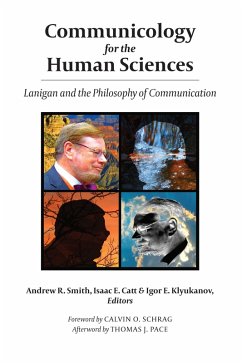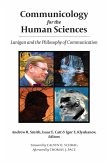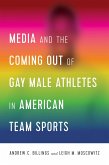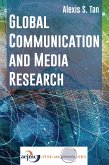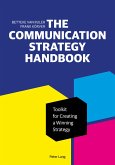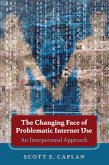Winner of the National Communication Association 2018 Philosophy of Communication Division Top Edited Book Award
This edited volume develops the philosophy of communication inspired by the scholarship of Richard L. Lanigan, with emphasis on communicology as a human science. Lanigan's syntheses of the philosophies of speech, language and discourse stemming from the works of Edmund Husserl, Maurice Merleau-Ponty, Michel Foucault, Julia Kristeva, Charles Sanders Peirce, Roman Jakobson, Umberto Eco, Pierre Bourdieu, Jurgen Reusch and Gregory Bateson, and many others offers a compelling framework for systematic analysis of human communication in all domains of lived experience. His work defines the theory and method of the human sciences in general and the discipline of communicology in particular. The focus in this collection is on the theoretical and methodological foundations for semiotic phenomenology whereby communication is recognized as constitutive of all human conscious experience and social relationships, involving gestural, nonverbal, discursive, performative, artistic, poetic and mass mediated forms.
The volume is divided into five thematic sections: Founding(s), which marks out primary influences on communicology conceived as a human science; Tropologic(s), which reveals how abduction, adduction and semiosis are essential for understanding human conduct in multiple forms of expression; Trans/formations, which addresses problems of change in self-other relations advancing an ethical life; Voicing Bodies/Embodied Voices, which elaborates the reversible relations between body and voice, and voice and world; and Horizons of Communicability, which takes up operative intentionalities that typically escape human conscious experience. All chapters are original to this volume, written by leading international scholars in the philosophy of communication who cross several disciplinary boundaries in the human sciences.
This edited volume develops the philosophy of communication inspired by the scholarship of Richard L. Lanigan, with emphasis on communicology as a human science. Lanigan's syntheses of the philosophies of speech, language and discourse stemming from the works of Edmund Husserl, Maurice Merleau-Ponty, Michel Foucault, Julia Kristeva, Charles Sanders Peirce, Roman Jakobson, Umberto Eco, Pierre Bourdieu, Jurgen Reusch and Gregory Bateson, and many others offers a compelling framework for systematic analysis of human communication in all domains of lived experience. His work defines the theory and method of the human sciences in general and the discipline of communicology in particular. The focus in this collection is on the theoretical and methodological foundations for semiotic phenomenology whereby communication is recognized as constitutive of all human conscious experience and social relationships, involving gestural, nonverbal, discursive, performative, artistic, poetic and mass mediated forms.
The volume is divided into five thematic sections: Founding(s), which marks out primary influences on communicology conceived as a human science; Tropologic(s), which reveals how abduction, adduction and semiosis are essential for understanding human conduct in multiple forms of expression; Trans/formations, which addresses problems of change in self-other relations advancing an ethical life; Voicing Bodies/Embodied Voices, which elaborates the reversible relations between body and voice, and voice and world; and Horizons of Communicability, which takes up operative intentionalities that typically escape human conscious experience. All chapters are original to this volume, written by leading international scholars in the philosophy of communication who cross several disciplinary boundaries in the human sciences.
Dieser Download kann aus rechtlichen Gründen nur mit Rechnungsadresse in A, D ausgeliefert werden.
"We are in a world where scholars increasingly define themselves away from all other realms of thought except some cramped field of expertise whose walls relentlessly move in like some torture-room dreamt by Edgar Alan Poe. In the face of this, Richard L. Lanigan's commitment is to think phenomenologically to give us the open-air insight that communication is by human consciousnesses, to others, about matters whose truth is in our mutual world. In this book we have so much evidence of the wide, breathing fruitfulness of this effort of communicology." -Peter Ashworth, Emeritus Professor Department of Psychology Sociology and Politics, Sheffield Hallam University, Sheffield, England

